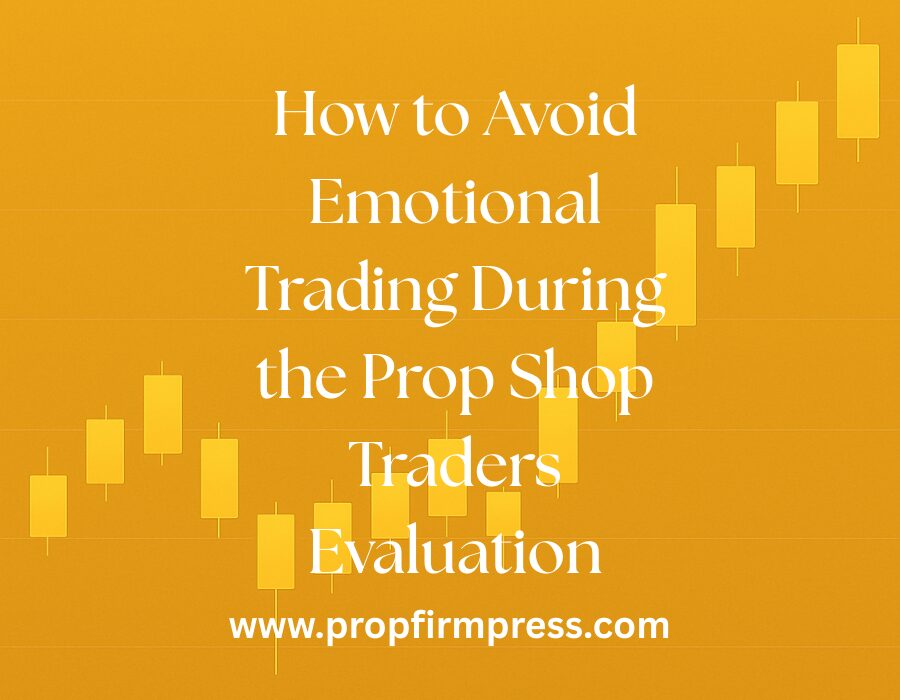How to Avoid Emotional Trading During the Prop Shop Traders Evaluation
Understand the Impact of Emotions on Trading Performance
Emotional trading is one of the most common pitfalls that many aspiring prop shop traders face during their evaluation. The pressure to perform, combined with the risk of losing potential funding, often triggers fear, greed, and frustration. These emotions cloud judgment, leading to impulsive decisions and poor trade execution. Understanding how emotions affect your trading can help you develop strategies to maintain composure and stick to your plan throughout the evaluation process.
Develop a Robust Trading Plan
A well-structured trading plan is essential to avoid emotional trading. It serves as a roadmap and provides clear rules regarding entry and exit points, risk management, and position sizing. During the prop shop evaluation, adhering strictly to your plan minimizes the likelihood of deviating due to emotional impulses. The discipline of following your plan helps create consistency, reducing anxiety and increasing your chances of success.
Implement Risk Management Techniques
One of the biggest stress triggers during a prop shop traders evaluation is the fear of losing capital. Proper risk management techniques will help mitigate this fear and reduce emotional responses. Setting stop-loss orders, risking only a small percentage of the evaluation capital per trade, and defining the maximum daily drawdown limit are fundamental strategies. This structure ensures that losses remain manageable and prevents panic-based decisions that can ruin your evaluation.
Use a Trading Journal to Track Your Emotions and Performance
Maintaining a trading journal is an effective way to keep track of both your trades and your emotional state. Recording your thoughts before and after trades can provide insights into how emotions influence your decisions. Over time, reviewing your journal can reveal patterns of emotional vulnerabilities so you can proactively address them. This introspection is invaluable during the prop shop evaluation, as self-awareness leads to better emotional control.
Practice Mindfulness and Stress-Reduction Techniques
Trading in a high-pressure environment like a prop firm evaluation can elevate stress and emotional reactivity. Integrating mindfulness exercises such as deep breathing, meditation, or even short breaks between trading sessions can help calm your mind. These stress-reduction methods improve focus, allowing you to approach trades with a level head. By remaining calm, you are more likely to follow your trading plan and avoid the pitfalls of emotional trading.
Set Realistic Goals and Expectations
Often, emotional trading stems from unrealistic expectations or pressure to meet aggressive targets instantly. Setting achievable goals during your prop shop evaluation reduces unnecessary emotional strain. Understand that losses are part of the game and that consistent performance over time is more important than chasing quick profits. Realistic goals keep you grounded, avoid desperation trades, and promote steady progress.
Focus on Process Over Results
One of the best ways to minimize emotional trading is to concentrate on following your process rather than obsessing over daily profit and loss. Evaluation programs often emphasize risk control and consistency, so prioritizing your trading methodology reinforces good habits. When your focus is on executing your plan correctly rather than on outcomes, you reduce anxiety and create an environment conducive to long-term success.
Simulate the Evaluation Environment Beforehand
Preparing mentally and practically by simulating the prop shop evaluation environment helps accustom you to the pressure and constraints. Use demo accounts or backtesting to practice trading with the same rules, time constraints, and targets. This rehearsal helps reduce surprises that may trigger emotional responses during the actual evaluation. Familiarity with the conditions builds confidence and emotional resilience.
Establish a Support System
Having a support system of fellow traders, mentors, or trading communities can provide emotional reassurance during the challenging evaluation period. Sharing experiences and discussing setbacks reduces isolation and emotional burden. Experienced traders can offer guidance on managing emotions and maintaining discipline. This network acts as a safety net, helping you stay grounded and motivated under pressure.
Limit Overtrading and Avoid Revenge Trading
Two common emotional traps during prop shop evaluations are overtrading and revenge trading, where a trader impulsively takes excessive trades or tries to recover losses quickly. Both behaviors undermine risk management and often lead to rapid drawdowns. To avoid these, set clear daily trade limits, stick to your plan, and accept losses without emotional retaliation. Discipline in trade selection is vital to preserving capital and passing the evaluation.
Prioritize Sleep and Physical Well-Being
Physical health directly affects mental clarity and emotional stability. Lack of sleep, poor nutrition, or insufficient exercise can exacerbate stress and reduce your ability to control emotions during trading. Make sure to get adequate rest, eat balanced meals, and incorporate physical activity into your routine. A healthy body supports a focused mind, which is crucial when navigating the demands of a prop shop trading evaluation.
Recognize and Accept Emotional Triggers
Being aware of the specific situations or outcomes that trigger your emotional reactions is essential. Whether it’s a losing streak, a missed opportunity, or feeling pressured to prove yourself, identifying these triggers allows you to prepare coping mechanisms in advance. Acceptance means not fighting the emotions but acknowledging them and choosing how to respond thoughtfully rather than react impulsively.
Use Technology to Enforce Discipline
Utilizing trading software features like automatic stop-losses, alerts, and position size controls can help enforce your discipline and minimize emotional interference. These technologies act as impartial guards that execute your plan consistently, even when emotions might tempt you to override your rules. Leveraging technology enhances your ability to stick to your evaluation objectives without succumbing to psychological bias.
